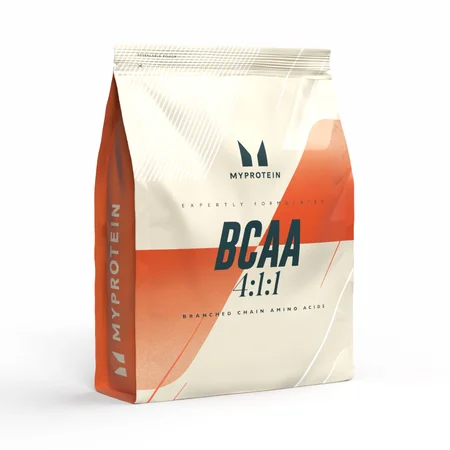¿Cuántos BCAA tomar al día? ¿Cómo tomarlos?

Muchos atletas se preocupan por tomar suplementación deportiva para mejorar el rendimiento deportivo y conseguir un cuerpo musculado y atlético, pero ¿cuántos se preocupan por las cantidades que deben tomar de cada suplemento? En este artículo veremos cuántos BCAA tomar al día y cómo tomarlos para aprovechar sus beneficios.
Índice:

¿Qué son los BCAA?
Los BCAA son 3 de los 9 aminoácidos esenciales que el cuerpo no puede producir por sí mismo, lo que quiere decir que debemos consumirlos cada día a través de la dieta. Los 3 BCAA o aminoácidos ramificados son isoleucina, leucina y valina.
Una de las funciones principales de estos tres aminoácidos esenciales es aumentar la tasa de síntesis de proteínas musculares del cuerpo,¹ lo que, en definitiva, puede ayudar a ganar masa muscular.²
¿Cuándo tomar BCAA?
La respuesta rápida y corta sería “cuando los necesites”, pero hay que explicar el por qué y el cómo, así que allá vamos.
Como ya hemos visto, los BCAA son la base de las proteínas que forman los músculos y siempre que tengamos una mayor demanda de proteínas, también tendremos mayor demanda de aminoácidos. Pero ¿cuándo puedo tener una mayor demanda de proteínas? Pues generalmente cuando se realiza algún tipo de deporte físico de intensidad media/alta.
Si por ejemplo juegas al tenis de mesa (también conocido como ping-pong), tu demanda de proteínas no será mucho mayor que la de cualquier otra persona. Pero si tu deporte son las pesas, la cosa cambia.
El fitness es un deporte en el que básicamente se busca un cambio físico, ya sea mediante el aumento de masa muscular o la pérdida de grasa (también hay quien persigue los dos objetivos al mismo tiempo).
Para ello se realizan ejercicios con pesas, con los que se pretende mover grandes pesos para estimular un mayor número de fibras musculares y así romperlas para que posteriormente se reparen, se hagan más fuertes, resistentes, y aumenten de tamaño.
En un caso así la demanda de proteínas y aminoácidos aumentará de forma exponencial y habrá que aumentar su consumo para abastecer al cuerpo de los nutrientes que necesita para recuperarse y seguir adelante hacia el objetivo fijado.
Aquí es donde entra la suplementación con BCAA, porque si no somos capaces de conseguir el aporte óptimo de aminoácidos para acelerar la recuperación mediante la alimentación, necesitaremos un suplemento para que acabe el trabajo.
¿Quién puede tomar BCAA?
Como acabamos de ver, puede tomarlos cualquier persona que realice algún deporte de alta intensidad y su requerimiento calórico sea mayor.
Da igual que seas hombre o mujer, que tengas 20 o 60 años, o que seas futbolista, tenista o simplemente entrenes con pesas en un gimnasio. Si necesitas tomar aminoácidos porque notas que tu recuperación no es la adecuada, ¡tómalos!
¿Cuántos BCAA tomar al día?
Hay un dicho muy popular que dice que “cada persona es un mundo”, lo cual es totalmente cierto y se aplica al consumo de la mayoría de suplementos del mercado, porque cada persona tenemos unas necesidades nutricionales distintas y unos objetivos distintos. Teniendo esto claro, ya tenemos la mitad del camino hecho.
Por ejemplo, un culturista profesional no tendrá las mismas necesidades nutricionales que un futbolista profesional. Seguramente los dos tomen BCAA, pero muy probablemente lo harán en cantidades muy diferentes.
Otro factor que se debe tener en cuenta además del estado físico del individuo o del nivel de actividad física y su intensidad, es la calidad del suplemento de BCAA que vayas a tomar. Según la calidad y la cantidad de aminoácidos que aporte cada suplemento, habrá que tomar más o menos cantidad de este para conseguir el aporte necesario.
Por lo general, la dosis adecuada suele rondar los 5 g por cada toma, y se recomienda tomar entre 20-30 g al día para conseguir unos resultados óptimos.
Por ejemplo, si tu nivel de entrenamiento es muy alto, mueves grandes pesos y realizas entrenamientos largos e intensos, deberás estar más cerca de los 30 g diarios repartidos a lo largo del día.
Los mejores momentos del día para tomar los BCAA serían:
- Junto al desayuno: 5 g
- Junto a la comida del medio día: 5 g
- Pre-entrenamiento: 5 g
- Intra-entrenamiento: 5 g
- Post-entrenamiento: 5-10 g
- *Antes de dormir: 5 g
*Si un día en especial has aumentado considerablemente la intensidad del entrenamiento y crees que puedas necesitar un mayor aporte de aminoácidos para mejorar la recuperación, puedes añadir otra toma de 5 g más de BCAA antes de acostarte junto a tu batido de caseína para que el organismo disponga de todo lo necesario para recuperarse durante la noche.
Conclusión
Algo que siempre recomiendo es escuchar a tu cuerpo y conocerlo bien para saber cuáles son tus necesidades y cómo suplirlas con éxito para conseguir tus propósitos.
Para ello deberás ir probando hasta que des con la fórmula que te permita mejorar cada día y sobre todo que te haga sentirte bien contigo mismo, que al final es lo más importante.
¿Te ha gustado este artículo?

- Mitchel CJ, Churchward-Venne TA, Cameron-Smith D, Phillips SM (2015). What is the relationship between the acute muscle protein synthesis response and changes in muscle mass? J Appl Physiol. (2015). 118: 495-497
- Jackman SR, Witard OC, Jeukendrup AE, Tipton KD. (2010) Branched-chain amino acid ingestion can ameliorate soreness from eccentric exercise. Med Sci Sports Exerc. 42(5):962-70, 2010.














